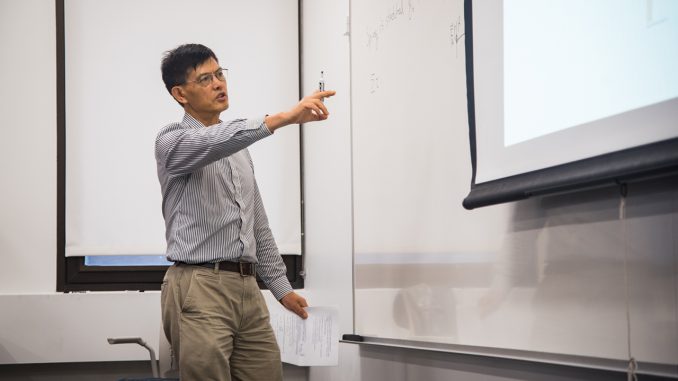
Most people who receive prizes from the American Physical Society, the world’s second-largest association of physicists, earn them as a result of something they did in a lab, Shelly Lesher said.
But Xiaoxing Xi, the Laura H. Carnell professor of physics at Temple, will receive one as a result of what happened in his home, said Lesher, chair of the APS’s Andrei Sakharov Prize committee.
In 2015, the Federal Bureau Investigation accused Xi of sharing sensitive technology research with Chinese scientists. Agents went to his home, held his family at gunpoint and interrogated and strip-searched him while in police custody.
Two years later, they dropped the charges against him. Since then, he has advocated for other Chinese-American researchers targeted by the government.
Xi, who will receive the prize for what the APS described as “important work in highlighting human rights abuses,” said he had mixed emotions when he was notified of the award.
“It’s complicated,” he said. “It’s bittersweet. Of course, I was very deeply moved. This is my professional community.”
“This is a very prestigious prize, it’s a tremendous honor to get it,” Xi added. “But it was not what I had in mind when I devoted myself to physics. I aspired to be recognized for the great discovery I would make in my research.”
The Sakharov Prize, which is awarded annually, is worth $10,000. A 10-person panel of fellow scientists decides the winner.
Xi, who is now suing the FBI for the raid, is waiting for the judge to rule if the case can go forward. His lawsuit is backed by the American Civil Liberties Union.
In recent years, Xi helped form End National Security Scapegoating, an advocacy organization for researchers targeted by the government, and has also appeared on panels to discuss his personal experience of what he considers a dangerous national trend: alleged racial profiling of Chinese-American academics.
“They call all the Chinese professors and students ‘non-traditional collectors‘ for China,” Xi said. “That’s the term. They say they never target a people based on their race, their ethnicity, but on the other hand, they accuse the Chinese government of using these people as ‘non-traditional collectors.’”
“This is very troubling,” he added. “Why are Chinese scientists being singled out? That is racial profiling.”
The FBI used a FISA surveillance warrant to investigate Xi and dropped the case once they had received new information, the New York Times reported.
Federal officials based their case against Xi on a misinterpretation of a set of blueprints, the New York Times reported, and dropped charges soon after discovering their mistake.
The FBI declined to comment on the pending lawsuit.
Xi hopes the lawsuit will clear his own name, he said.
“When I was arrested, I had nine federal contracts, now I have two,” he said. “My research is not as large as it used to be.”
Since 2015, Xi has been careful when applying for grants because making even the slightest mistake on a form is a federal crime, he added.
“After I have seen how the federal government can change an innocent person without basis, it made me very scared.” Xi said. “I’m constantly worried that could be a reason for trouble.”
Xi was chosen for the prize because of his advocacy for others in similar positions, Lesher said.
“You would understand if, after what happened, he’d try to put it all behind him,” she said. “That’s not what he did … He got this award because something horrible happened to him that he turned into activism.”
“I felt like I had to speak up,” Xi said. “I don’t want to see other people’s careers destroyed.”



Be the first to comment